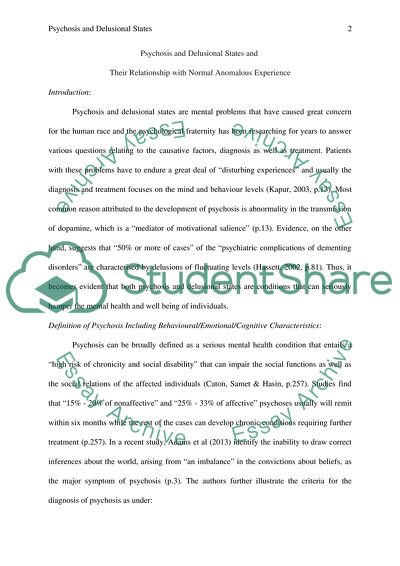Cite this document
(Psychosis and Delusional States and Their Relationship with Normal Anomalous Experience Essay Example | Topics and Well Written Essays - 1750 words - 1, n.d.)
Psychosis and Delusional States and Their Relationship with Normal Anomalous Experience Essay Example | Topics and Well Written Essays - 1750 words - 1. https://studentshare.org/psychology/1807716-psychosis-and-delusional-states-and-their-relationship-with-normal-anomalous-experiences
Psychosis and Delusional States and Their Relationship with Normal Anomalous Experience Essay Example | Topics and Well Written Essays - 1750 words - 1. https://studentshare.org/psychology/1807716-psychosis-and-delusional-states-and-their-relationship-with-normal-anomalous-experiences
(Psychosis and Delusional States and Their Relationship With Normal Anomalous Experience Essay Example | Topics and Well Written Essays - 1750 Words - 1)
Psychosis and Delusional States and Their Relationship With Normal Anomalous Experience Essay Example | Topics and Well Written Essays - 1750 Words - 1. https://studentshare.org/psychology/1807716-psychosis-and-delusional-states-and-their-relationship-with-normal-anomalous-experiences.
Psychosis and Delusional States and Their Relationship With Normal Anomalous Experience Essay Example | Topics and Well Written Essays - 1750 Words - 1. https://studentshare.org/psychology/1807716-psychosis-and-delusional-states-and-their-relationship-with-normal-anomalous-experiences.
“Psychosis and Delusional States and Their Relationship With Normal Anomalous Experience Essay Example | Topics and Well Written Essays - 1750 Words - 1”. https://studentshare.org/psychology/1807716-psychosis-and-delusional-states-and-their-relationship-with-normal-anomalous-experiences.


